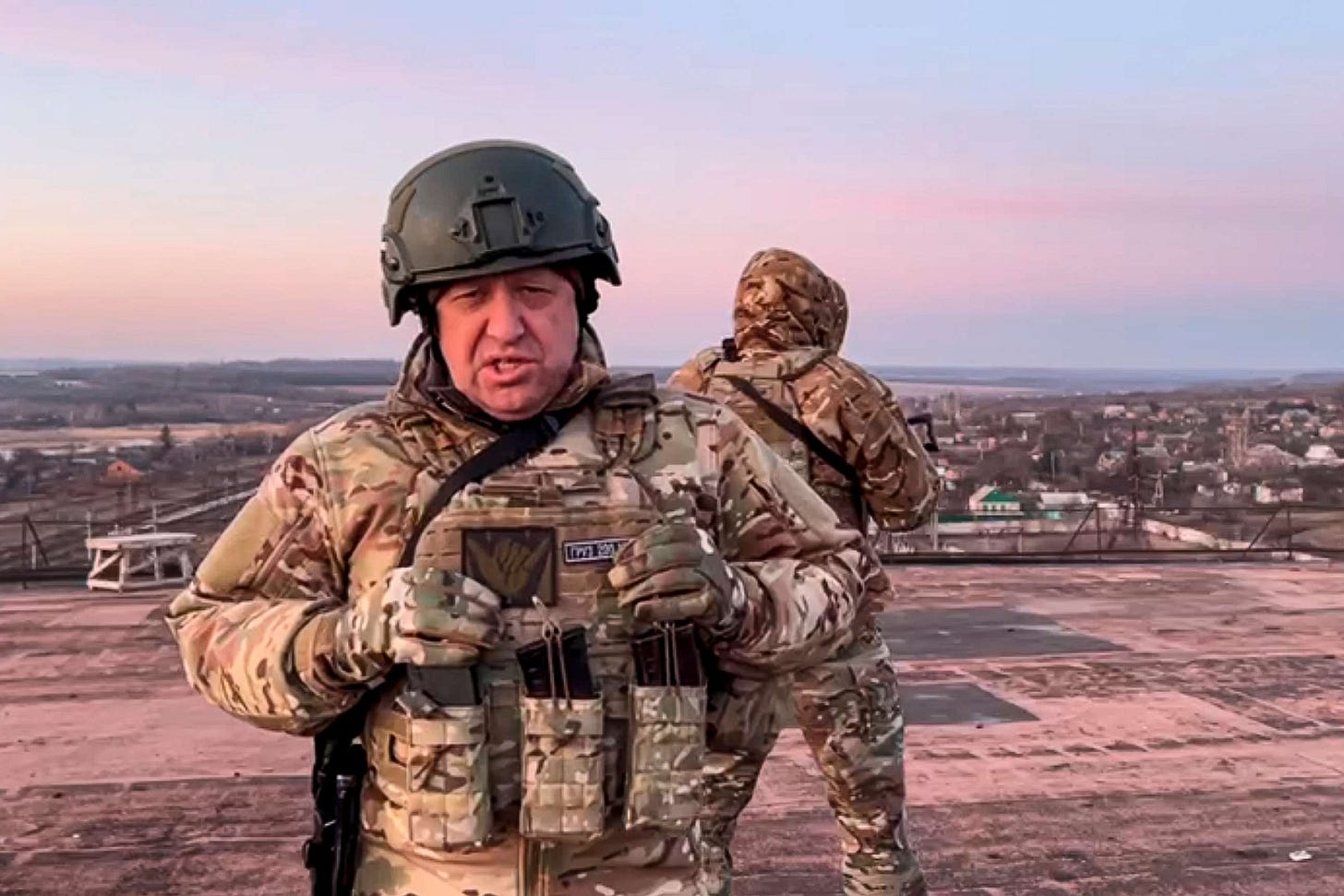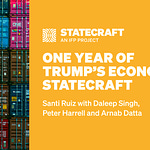Today’s guest is John Lechner, a writer and researcher. He's here today to talk about his new book about the Wagner Group, a Russian state-funded private military group, or PMC. The book is called Death Is Our Business: Russian Mercenaries and the New Era of Private Warfare, and is out March 4th (you can preorder it here). It’s a crazy read, and draws on multiple trips John took to frontlines in Ukraine, Syria, Libya, the Central African Republic, and Mali. As a mutual friend told me, “John knows more about the Wagner Group than anyone not in the Wagner Group.” I asked John to help me better understand how state capacity works in the particular institution of PMCs.
Some questions I had:
How does a private military company (PMC) work? What’s the bureaucratic structure of a PMC?
How does a successful PMC operate? How does it scale?
How does a state like Russia use a PMC for its own ends (and how do PMCs use states for their own ends)?
How do Russian PMCs like Wagner compare to American PMCs like Blackwater?
There’s a lot we weren’t able to cover, like the Chechen language textbook John wrote. But I think you’ll still enjoy this conversation.
For a printable transcript of this interview, click here:
Tell me about writing this book.
It involved a lot of effort, travel, and probably worry from my family, but I first started going to the Central African Republic (CAR) as a freelance journalist in 2019 – Wagner began operating there in 2018.
I spoke Russian and had spent a decent amount of time in Africa, and I was interested to see how these two different cultures were coming together and reacting to each other. After 2019, I started visiting two to three times a year.
To be clear, you were fully freelance — writing pieces for various outlets — with no long-term contract. You just wanted to be there.
I wanted to be there. I became fascinated by the Central African Republic’s political economy and the local conflict. I knew back then that I probably wanted to write some sort of book about what was going on in terms of Russia and Africa. That slowly morphed into a project to write about Wagner, and finally I put pen to paper in 2023. It was initially tough to sell the idea.
Really?
Folks thought it was a niche topic. “Oh, there are Russian mercenaries in Africa.” But it wasn't until Moscow's full-scale invasion of Ukraine in February 2022, where folks thought, “Oh, this is interesting.” And then when [Wagner Group leader] Yevgeny Prigozhin mutinied and marched on Moscow, Bloomsbury was happy to have a book on the subject, and I had a natural ending too, so that helped.
Our mutual friend James Pogue described you to me as the guy who knows more about Wagner than anybody else not in the Wagner Group.
Oh, I don't know what to say about that.
That’s not a no.
Before we get into the relationship between the Russian government and the Wagner Group, will you explain in brief where the Wagner Group comes from and how it's organized internally in its early years?
Wagner was never just one thing. Its purpose depended on both where we were geopolitically and where Wagner was present. Wagner's founder, Yevgeny Prigozhin, was an ex-convict, a tough but ambitious guy. When he got out of prison at the end of the Soviet Union, he found himself back in St. Petersburg, where he opened restaurants to cater to the elite. He was always a social climber looking to meet the next most important person in the room. He managed over time to leverage those connections from his restaurant business into catering contracts for the Russian military in schools.
Fast forward to early 2014, you have the Maidan Revolution in Ukraine. In response to that, Putin and his inner circle made the decision to annex Crimea. They turned to a number of patriotic Russian volunteers, both affiliated and unaffiliated with the state, to secure the peninsula, but also to ensure a referendum that would be in their favor.
That annexation of Crimea sparked a chain reaction in Eastern Ukraine, including Donbas, where anti-Maidan protesters seized administrative buildings, believing that they could also get the support of the Russian state for potential annexation or independence.
They start drawing Russian patriotic volunteers to their cause, guys like Igor Gurkin [alias Strelkov] who may or may not have had state support for his invasion.
These volunteers become a catalyst and put the Kremlin in a difficult position. The Kremlin didn't want to annex these territories at the time, but Putin was trying to co-opt the Russian nationalists at home, who, along with liberals and many other Russians, were protesting against his return to the presidency in 2012. He was between a rock and a hard place. He’s thinking, “I don't want to risk further sanctions, full-scale war and international isolation, but I can't be seen by the public as leaving these pro-Russian separatists out to dry.”
The Kremlin ends up supporting these separatists covertly and also supporting these “mercenaries” who are really working with the GRU [Russia's foreign military intelligence agency] and other Russian military institutions who go in. One of those groups was sponsored by Yevgeny Prigozhin.
Tell me about these young patriotic Russians who get pulled in to fight for the separatists or for the Wagner Group. What are some of the characteristics of these young men?
At least in terms of the volunteers who are flooding to Eastern Ukraine in 2014, they come from a number of patriotic organizations. They are guys predisposed to nationalist sentiment.
There's a Russian version of Boy Scouts, and these guys offer — it sounds silly — but military-type training for teenagers. There were people, like a guy I know well in the book, who have their own ideologies, like the leader of the Russian Imperial Movement looking to restore the czarist empire.
There are Cossack organizations who sought to re-found their relationship with the state after the fall of the Soviet Union, where they're security enforcers and have rights to land and certain privileges. Then you also have the guys in Wagner Group, who at first were largely composed of some men from a previous PMC structure called Slavonic Corps that went to Syria in a disastrous fashion. These guys were half Cossacks who were recruited. Many of these men served in the military, and when they got out didn't really enjoy being a mall cop, didn't enjoy the same thrill, missed the camaraderie and had difficulty adjusting to life. Then they found an opportunity to continue a similar career through these PMC structures.
For a lot of guys you talk to, it's fun. It's a blast, right?
It's a mix. That's always something that people ask: are they fighting for money or for Great Russia? Which is it? It's always both, because our ability to rationalize is infinite. It wasn't considered mutually exclusive. We live ourselves in a capitalist society where to make money and further the national interest is considered good.
Very few of these guys were pure mercenaries, in that they would fight for whoever paid them the most money. Most fought for a mix of reasons. They believe they're patriots furthering Russia's great power status and interests, but also because it's a relatively good paycheck as well.
Later, we see Wagner show up in the Central African Republic, and in Syria as well. Are those folks just as motivated by Russian nationalism, by a sense of their country's interest? Or does that belief matter less in Libya, say? As you get further afield physically? Because not every conflict is as central to the Russian interest as Ukraine is.
That's a good question. It's difficult to say necessarily, because so many of the guys I spoke to have done rotations through these different deployments, as they would call them, to Syria, to the Central African Republic, to Libya.
Ukraine had a hybrid war in Donbas in 2014, and then the full-scale invasion in 2022 was definitely considered more of a patriotic initiative. There were a number of guys within Wagner who were stationed in Mali or the Central African Republic who volunteered to go fight.
In the full-scale invasion, a number of them were from Donbas themselves. For them, it was something that was as personal as it gets. With regards to Syria, I think too, there was that sense that we are out here to defeat ISIS. One guy in the book talks about his experience in Syria, and he was originally with the Russian imperial movement. He saw himself as this Russian Orthodox warrior helping out the Orthodox citizens of Syria against the jihadists.
Is he the one who talks about the Roman legions?
Yes, he was fantasizing about Roman legions and going along the same Roman roads as a protector of the Christian faith. But I don't think that he was in the majority. A lot of those guys in Syria believed in the cause of fighting ISIS in particular, and were ex-military guys who saw this as what they do.
What does a typical deployment look like? You’re in country, then you go back home to Russia for a few months, recuperate?
The length could vary, six months to a year or so. There aren't a lot of people who are permanent employees of Wagner. Your average foot soldier or even a military specialist in some technical field signs up for fixed contracts. You serve out the fixed contract, you go home. A number of these guys would just go off and do something else. Or, if this was how you lived and how you put bread on the table, you would call up the guy in Wagner who is the head of recruitment and putting teams together. You'd say, “Hey, is there a spot? What else do you have for me?” And he'd say, “Nothing. Call back later.” And then you call back two weeks later and they say, “All right, come back to the base.” You weren't necessarily Wagner for life.
I didn't realize the amount of recruiting that went on in third countries before reading your book. You have Libyan guys who end up fighting in Syria with Wagner. You don’t have to be Russian to fight for Wagner.
Right. There was this crazy moment starting in 2019 where Wagner was supporting and fighting on behalf of Khalifa Haftar, the ruler of East Libya, who was trying to take Tripoli. He had tons of people involved. He had armed groups from Darfur and Chad fighting for him. He had the Russians coming in through Wagner Group. The Wagner Group was also recruiting Syrians that it worked with in Assad's territory to go to the front in Tripoli.
On the opposing side, the government of Tripoli struck a deal with the Turks, who then began recruiting massive numbers of Syrian mercenaries from the Syrian territory that they held. So you have these Syrians who are on opposite sides of the battlefield at home in Syria, across the Mediterranean fighting against each other in Libya.
I think it spoke to the direction that we're going or we've already reached. It's the dark underbelly of globalization, right? You can easily move these men who have no other skill set or economic opportunity other than to bear arms, and you can easily whisk them from one conflict zone to another for relatively cheap.
You kick off the book by talking about an article General Valery Gerasimov wrote in 2013, before the Crimean invasion. Gerasimov was the Chief of the General Staff of the Russian Armed Forces, and he's very interested in how the West helped overthrow Gaddafi in Libya without putting Western boots on the ground, in what he calls hybrid warfare.
What did the Russians pick up or interpret from Western involvement in Libya in the first part of the 2010s?
It's fascinating, because when Gerasimov wrote this article on hybrid warfare, what he was describing was what the Russians perceived as the West's version of hybrid warfare.
They were alarmed at what they believed were these Western machinations behind street protests that could quickly depose a leader, whether it was the Arab Spring, or what was especially concerning to them were the color revolutions [attempts, sometimes successful, to change former Soviet republics into Western-style democracies] in the former Soviet Union. They viewed Western rhetorical support as an effort to topple these regimes and saw that they used contractors as well to facilitate this.
You point out there are some Russian PMCs that worked with Americans in Iraq. There were kind of pure mercenaries — taking a good paycheck from anyone to do security.
It was a different time too, where you had much more openness. There wasn't as much animosity in 2007. There were one or two actual Russian PMCs that were working with the West in Iraq. There were even more Russians and Ukrainians who were working for Western PMC companies over there.
What are some of the paradigmatic Western contractors who are operating for the West in Iraq and Afghanistan?
I think the one that the Russians were familiar with was Eric Prince's Blackwater for sure. That model stuck with the Russians. After the Minsk II ceasefire in Donbas, Prigozhin has this mercenary force, but there's not really anything to do with them. As the Russian intervention in Syria unfolded, he viewed himself as potentially able to emulate a Western PMC within the Russian system.
Tell me about the characteristics of a Western PMC that were easily ported over to the Russian context. What were they seeing?
I'm not sure that they actually understood how Blackwater worked. They saw this as an economic opportunity to outsource. There were slightly different processes: Blackwater and the other big contracting firms in Iraq came out of a specific moment where under the Bush administration you saw a great Republican belief in the merits of privatization and small government.
Donald Rumsfeld said something like, “We want to be operating like a venture capital firm in this intervention.” There was a lot of opportunity within that administration for private companies to get contracts for rebuilding Iraq.
There was also a need, because ultimately the war on terror could not have been fought in the way it was if not for contractors. Earlier, everything that was tied to the military in a war was done by the military: chefs, guarding, convoys, all of those things. When we moved away from the draft, all of a sudden you didn't have the numbers anymore, the raw capacity to do it. You have to outsource a lot of that activity.
In Russia we saw in the 2000s — and particularly after the very brief war with Georgia — a desire to move towards a Western military model. Instead of the mandatory two-year service which they had at the time in Russia, they headed towards a professional military, like the US has, where people sign up for a contract. They're not draftees.
As they moved in that direction, they also had to address issues of supply. Prigozhin was able to take advantage of a similar trend overall in outsourcing and privatization. But then, as we saw very quickly, Wagner started to be used in a very different way than Blackwater or traditional Western PMCs.
Where they're not joined at the hip to the formal military, but they're doing things that the formal military does not want to be seen doing, or wants done at arm's length?
Blackwater and those Western PMCs were in the business of providing security for individuals, maybe convoys or fixed objects. They didn't have a mandate: “Hey, there's an ISIS cell over here. Go take it out.” That was not there. If they were under attack, they obviously had the ability to defend themselves.
It's a more passive role.
Yes. And Blackwater and others were very much embedding themselves within the national security infrastructure and really working with one government, the US government. This ensures more contracts and assured revenue.
Prior to the war on terror and Blackwater, throughout the nineties, the main player was a company called Executive Outcomes, a South African group founded by Eeben Barlow. They didn't have the luxury of being able to contract with their host government, as many of them were officers formerly under white rule in South Africa, and in the post-apartheid environment, there was no home for them. They contracted with local governments themselves to then go after, protect, or defend rebel groups, and they provided the full military kit.
The full offensive stuff as well.
Yes, and then you get to Wagner Group, which becomes somehow a mixture of these two.
One thing that you talk about in the book that's really striking, especially to people who have not followed Wagner, is that it's not just securing assets and fighting on the frontline. Wagner operates diplomatically. In the case of the Khartoum Accords, they bring the rebel groups together from the Central African Republic and they broker a deal. And they do commodity mineral extraction and all kinds of other heavy industry work.
It's not what you picture when you picture Blackwater guys and Humvees in the Green Zone. This is a completely different set of tasks.
Yes, absolutely. Prigozhin himself is an incredibly ambitious, entrepreneurial, vicious, cutthroat guy. He was someone who was very motivated by the deal. He loved money and power, but I think it was really about the deal. He was always going a million miles a minute, and he would expand into whatever he thought was a good business opportunity.
With his businesses back home in Russia he had the restaurants, his catering business, and he also saw an opportunity to get involved in troll farms. Originally it started out as trying to give favors to guys in the elite, to Putin going after Russian liberals and opposition, targeting them on social media, or just advertising for his company and trying to make sure that no one's talking s*** about him.
When he's all of a sudden going to another place like the Central African Republic, he's bringing those guys with him and then saying, “Here we are. We're offering training, but also if you're interested we’ve got a whole range of services for you.”
In minerals and mining, he caught the gold bug. He thought that he could make a lot of money in gold and diamonds. It turned out that it was much more difficult for them.
Why is that?
At the end of the day, in a country that's at civil war in an incredibly isolated and undeveloped place, it's actually a real pain to get diamonds out of the ground, to get them washed in Dubai, and then be able to use that cash to pay for your counterinsurgency. It's a total cash flow nightmare. He wasn't always like the smartest guy either. But he was incredibly ambitious.
That's very entrepreneurial; you throw a bunch of stuff against the wall and if it doesn't work, you move on.
That's what he was always doing. It worked like Putin's regime in miniature. What’s interesting is the degree to which, if you are framing what you're doing as furthering Putin's goals and Russia's great power status, you actually have a pretty decent amount of freedom to go out there and just throw things at the wall and see what sticks.
You point out that in conditions of great power competition, there are all these incredible market opportunities for actors like Prigozhin and the Wagner Group and other PMCs.
Because there's this great power conflict, there's tremendous amounts of money to be made, basically.
Of course, and there will be going forward. I'm always interested in greater narratives and how folks position themselves vis-à-vis these narratives to further their status, or to profit, or to move up in the ranks. Over the past decade, we're slowly seeing that shift from the war on terror, where the greatest threat is international jihadism to great power competition between the US and China. And to a lesser degree, Russia.
You can see it here in DC. Everyone contributes to but doesn't control the greater narrative.
They position themselves in a way to make sure that they’re profiting from it, not always monetarily, but also just discursively.
Look at the number of NGOs who are now looking to change projects that used to focus on the threat of terrorism or jihadist groups, but now are trying to counter China or something along those lines. It’s a very natural thing. There are security entrepreneurs as well, who look to position their services and their potential interventions that align with the threat that we now want to counter.
We are transitioning to that environment where people are now starting to reposition themselves. And when they reposition themselves, they further reify the threat narrative. And that's how I think it comes about.
I take a very constructivist approach to how Wagner operated and where Prigozhin was most talented. One of his associates says that he was very good at selling a dream back to the Kremlin of planting a flag in these various places. He framed what he did as furthering Russia's great power status.
Will you say more about what that dream looked like in places like the Central African Republic? People who are more foreign policy realists like myself can obviously see the Russian interest in Ukraine, and Syria to a degree. But what's the vision that's being sold of Russian influence in the Central African Republic? It’s not obvious to the outsider.
It's not as obvious because it's not there. Prigozhin was able to expand into all sorts of different enterprises in the Central African Republic. They were engaged in successful diplomacy when they first arrived, bringing together the government and 14 armed groups into an internationally recognized, UN-approved and applauded peace deal. They were involved in diamonds. They were involved in gold mining. They were political consultants. They were involved in timber. They owned a brewery at some point — they still own a brewery.
Where's the brewery?
It’s a vodka company in Bangui. They expand into wherever they think they can, and they’ll try everything.
But the reason they were able to do that, to operate like the British East India company in a way, especially in the Central African Republic, was because the Central African Republic wasn't important to Russia's other security institutions.
Whereas if you look at Ukraine in 2014, Prigozhin is one of many actors who were there. The GRU is there. The FSB [Russia’s Federal Security Service] is there. The presidential administration has people coming through over there. In Syria, Wagner wasn't there for plausible deniability because the Russian military was openly intervening in the conflict. The Russian MOD [Ministry of Defense] was there.
These other institutions provided a check on Prigozhin's activities. But when you get to the Central African Republic, it's all you. The embassy has just a couple of guys there, and so he was able to just expand freely into whatever he wanted to. Wagner still wasn't able to do everything that they wanted to do in CAR, because they were still operating in a conflictual environment with local power brokers and society provides checks as well on what they're able to do. But the competition from other Russians was very light, and so he basically became the Russian state in CAR.
Will you give us a quick breakdown of the different entities in the Russian defense apparatus?
You have the FSB, which is the descendant of the KGB, but they are largely focused on domestic threats and regime protection. They are separate from the Russian military, the Ministry of Defense. Within the ministry of defense, you have military intelligence, the GRU. They are geared toward operating abroad. They will engage in assassinations abroad. They also just do normal things like training foreign forces. That was the group that Wagner worked probably most closely with. You also have the SVR [Foreign Intelligence Service], which is just the actual kind of spying operation abroad and then any number of border forces and things along those lines that fall into it.
In the book, you discuss how the leash the Wagner Group is on from the Russian government gets longer or shorter in different ways.
Which actors are reeling Wagner back in at different times?
Some of these questions are black boxes, in terms of who Prigozhin was dealing with internally at different times. We can say that Wagner was working closely with the Russian state in areas that were of clear Russian national interest. That’s shown by the presence of other Russian institutions there. If the GRU, the FSB, and the MOD are all in Syria, it's probably pretty important to the Russians. And Ukraine as well.
Libya was kind of important, although not on the same level of Syria or certainly Ukraine. But once you're getting into sub-Saharan Africa, that interest drops off, and there's a lot more room for an entrepreneur like Prigozhin to position himself as the Russian state.
He also presented himself differently to different people.
There's a mystique that he was very happy to let build up.
He knew how to take advantage of the ambiguity of his group. When he was meeting with the president of the Central African Republic, he was certainly representing himself as the Russian state. Even if he might not have had much backing of the Russian state or he was operating on his own, as we saw with the Khartoum agreement, he was bringing all these groups together. Often, especially in Africa, he was operating out of his own pocket, in the hopes that he could then draw the Russian state in afterwards with subsidies and other support. So it's very difficult to pin down at any given moment.
We’re recording this here in Washington, DC, the capital of public private partnerships too. Lockheed Martin is a profit-driven enterprise. They'll never tell that to a US government official, though, because it’s all about, “How can we further America's security?” But they're undeniably profit driven as well.
Lockheed Martin or others would certainly want to hire people from the US government for their connections in order to ensure future contracts and be able to continue business with the US government, what we call the revolving door.
There is a version of that happening in Russia. They transitioned from a state-planned economy 30 years ago to this oligarchic system. Often, individuals are representative of institutions too, and Wagner and Prigozhin crossed both private and public lines and blurred them in a way that is more blurred in the US than we tend to think. We think of these things as discrete categories, but in practice, there's often more of a blurry relationship.
But in Russia, it's probably even more so.
After Prigozhin’s mutiny, and later, I'm going to say, assassination…
You said it, not me.
It’s something of a black box, but I feel pretty confident throwing that term out there. What's the status of PMCs in Russia? What's happened since?
He always pushed the definition of PMC. What he was engaged in was always a mixture of both private and public enterprise. What we see now are groups that are labeled as PMCs, but in reality are subordinate to the ministry of defense.
But interestingly — and this shows a little bit of the political economy of Putin's system and the one in which Prigozhin was operating — there's still room for private individuals and oligarchs to sponsor a PMC. The Russian government still operates with a lot of capacity restraints and a lot of funding restraints.
And PMCs and the oligarch can fill in some of those.
It’s a form of virtue signaling. You show the state, “Hey, look at me, I've got some skin in the game here. Think of me the next time that contract, the food, catering comes up. Look at what a good servant to the state I am.”
It’s very feudal, or neo-medieval.
Totally. It definitely has that aspect to it.
But as we talked about, did the state really feel the need to go into the Central African Republic? No. But individuals have agency and they have the ability to lobby for something that they think they could get something out of, and guys like Prigozhin had both agency and freedom to pursue these initiatives. The risk for them was that they're putting up their own money. So if it doesn't go well, it's their loss.
But if it is successful, then as Prigozhin was constantly frustrated by, there's a risk that the Kremlin just takes credit for what you're doing. It's very frustrating, and it sometimes results in mutiny. There’s an instance in the book in Libya where the guy from RSB [another Russian PMC] had that mining contract in Benghazi. Then guys in the GRU show up and say, “Oh nice de-mining business you have here. We'd like to buy you out.”
That does happen, so if you’re smart, you operate a little bit like a startup company that expects to be bought out by a competitor later. The head of RSB in that instance got paid a pretty fair price, but he also didn't have a choice.
There’s something fascinating about the simultaneously very intelligent, entrepreneurial mode of operation. A lot of these guys are the same guys who are drinking themselves to death on disinfectant alcohol, for instance, and committing all kinds of war crimes and atrocities.
These rational actors are very effective freelancing for themselves, and are also often off the chain and uncontrolled in these environments.
I tried to really focus on individuals and get their stories to give a sense of a whole, because all sorts of people ended up working for Wagner or for Prigozhin, like geologists and academics who came in and just did consulting.
You get guys like Marat, who’s now left Russia for the West. He was very much a military guy, who sees this is what he’s meant to do, and he stays fit and makes sure that he's trained and disciplined, and then you get other guys who are total psychopaths.
They experience a freedom in Wagner that they're not going to get anywhere else, and they exercise it.
Exactly. And you get guys who were just total drunkards. If you look through some of the leaked documents, you see how much effort there was internally within Wagner, bureaucratically, to make sure that people are not drinking and doing drugs, not doing crazy stuff.
I was reading this over Christmas, just as Assad's Russia-backed regime in Syria was falling apart. You highlight very clearly the disdain that folks from Wagner have for the Syrian security forces when they have to retake Palmyra for the second or for the third time. What's your sense of the future of Russian involvement in Syria?
I managed to get one source who fought with Wagner, a Syrian who fought with Wagner in Libya as well. But Assad’s Syria was not a very easy place to get people to chat. So that's all I'll say.
I'm sure a lot of the disdain was mutual, and they had an incredible amount of complaints about Wagner as well. Hopefully we can capture a little bit more now in this environment. But I think that at the moment there are talks ongoing about Russia being able to keep its bases, especially its air base at Hmeimim and the naval port at Tartus.
Ahmed al-Sharaa, Syria’s new president, has to consolidate his position politically at home. He has to worry about an economy that’s absolutely in tatters. Money is going to be an issue, and I don't see the rest of the international community being quick to lift sanctions on Syria and open up trade. Which makes it very difficult for him not to deal pragmatically with Russia at this point. Who’s going to pay the rent for those bases? No one else needs them. That's a chunk of change that will probably be tough to pass up.
I think he'll try and get as much as he can out of it. He's already mentioned to the Russians handing over Assad. There's reason to think that they wouldn’t do it, because it sends a bad signal to the other folks that they support, but they could probably find the right narrative as to why it was the right thing to do — And it is the right thing to do, they should hand over Assad.
The initial reaction from a lot of people, including me, was, “Say goodbye to those bases.” But now I feel that the Russians might actually pull it off and be able to keep them. It'll be a very different relationship with the government.
They’ll certainly have a lot of distrust that they'll have to overcome, given that the guy who's now in power was sitting under Russian bombs for a long time. But al-Sharaa knows how to do things; they must have had McKinsey consulting him or something about the transformation. He's too good at it. It's remarkable. It's incredible.
It will be very interesting to watch that relationship between the Russians and the rebels. In 2018 I worked for a summer at Airwars, tracking civilian casualties in Iraq and Syria. I spent months just sifting through bomb site photos. There's a lot to forgive.
Last line of questioning. You've done some remarkable foreign correspondence here. You were in Ukraine, you were in Syria, you were in CAR, you were in Libya. What practical or tactical advice would you have for people who want to do reporting work in conflict zones?
You have to make sure that you are working with people on the ground whom you trust and that you listen to them whatever they say and don't deviate.
If they say don't do it, you have to trust them because you're also in turn responsible for the people whom you're hiring and working with too. In Ukraine during the beginning of the full-scale invasion in 2022 and 2023, there were a number of folks who were killed because they wouldn't listen to their fixer, or they pushed to always try and get the next thing. You have to take a risk, but you have to make sure that you don't push yourself over the edge.
Also, however much I can, I go to places first and take it easy. The first time I went to the Central African Republic, I just met a bunch of people. You get a sense of the place, make friends, keep in touch with them. And then the next time you go, you realize, “I know the lay of the land a little bit more. I know the people.” Instead of just showing up and trying to do something crazy.
What was the hairiest situation you were in while reporting this book?
It’s in the book: I disappeared into a black site in Mali for two days: got blindfolded and spirited away.
That was probably scarier for my family than it was for myself because there's a lot of Al Qaeda and ISIS that operate over there, local affiliates. They had the FBI telling them that they’ll be lucky if it's Al Qaeda and not ISIS. That was not fun for them
I look a bit like a guy in Wagner and can be mistaken for one. Usually when I was meeting in CAR with the guys in Wagner, I would meet with them in Bangui, the capital, because there's just more infrastructure there. Once you go outside of Bangui, there's nothing, you're off the map.
There's always this humanitarian infrastructure in these places as well. In these crazy remote places, you'll find (or at least formerly you would) USAID and things along those lines.
Those were the people who were the most commendable, because I would do these things and then get whatever partial glory of writing a book about it. But there are so many people out there who just do their work and are not in the spotlight.
There's this big debate going on about USAID and the humanitarian value of this work. But what do you think about the soft power component specifically of our humanitarian work abroad? How do you weigh it against the hard power that Wagner is exerting in places like CAR?
It's huge in Africa. The humanitarian work is massive, and it's massively important for the US's image as well. I've talked to Russians about it. They always felt that the presence of USAID was something that always put them on the back foot as they would never be able to oust the Americans from anywhere. They ousted the French, but they never ousted the Americans from any particular place. Because of how important USAID is, I can say that I was probably released from detention a lot earlier. They are still a tremendous presence in the Central African Republic. Especially in an environment where the US is not interested in committing troops to conflicts, humanitarian aid bought an incredible amount of influence.
You closed the book with this vignette about Niger, where we weren't forced out by Wagner, but we may have accidentally forced ourselves out of Niger by invoking Wagner and overplaying our hand. Niger's Prime Minister said that US Assistant Secretary of State for African Affairs Mollie Phee urged him in March 2024 to pull back on Niger’s engagement with Iran and Russia. Apparently we were not offering enough in return — it was all stick and no carrot — and we got kicked out of the country for it.
I think we're heading back towards this Cold War environment. There's a way to look at the Cold War as this inherent competition between the Soviet Union and the United States, but there's also a way to see it as a product of decolonization at the time. The competition was also only possible because there were all of these new states emerging, and there was the question of, “Will they be communists or will they be capitalists?” In that environment, these states have a lot of power in balancing and playing these competitors off of each other, especially the elite in these countries.
Multipolarity will come to different parts of the world more quickly than in others. Africa is one of those places where it has come more quickly, or is already here. Wagner very much helped create the narrative of great power competition in Africa, and then benefited from it. Both phenomena were happening at the same time, but that competition was coming out because for the first time in 30 years, there was an alternative security provider to Western-dominated intervention.
African leaders have been doing this forever. They know perfectly well how to play each one against each other. We’re back in that environment, and it's important to recognize that these states also have a lot of power and ability and cunning in them to navigate this.
John, thank you for joining. John Lechner's book is called Death Is Our Business: Russian Mercenaries and the New Era of Private Warfare.













